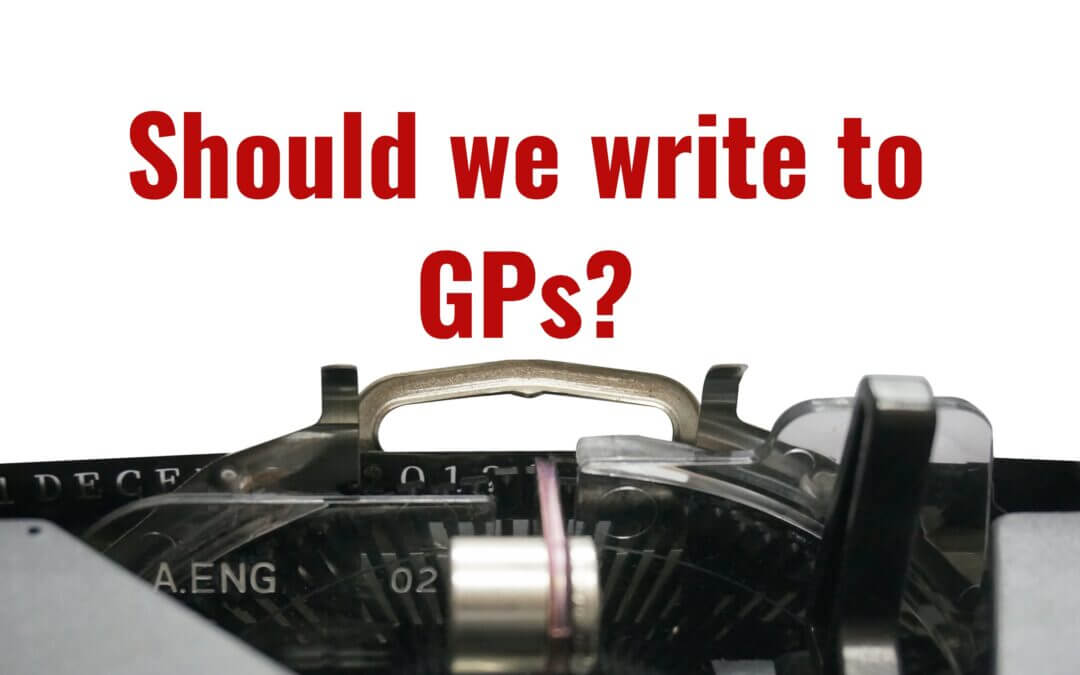Why do we write to a patient’s GP in the first place
Should we write to a patient’s GP?
 Why do you write to the patient’s GP? This was the question posed to a podiatry Facebook group and the replies came in brimming to the gunnels. This is the type of question I love because it brings heaps of different reflective thoughts together. First of all. Is there a straight yes or no? Perhaps there is. This article hopefully will offer more thoughts on the subject. WHY? Maybe it’s to ask permission, maybe its to confirm a referral and maybe its simply to advise. In all cases every letter or communication is a record. A documentation of action and response. The FB page had different groups of podiatrists who responded to this question last year. The podiatric surgeons were easy to spot. Why? Because they were consistent in their advice and all used the same ethical views. Their training instills in them that GPs must have communication.
Why do you write to the patient’s GP? This was the question posed to a podiatry Facebook group and the replies came in brimming to the gunnels. This is the type of question I love because it brings heaps of different reflective thoughts together. First of all. Is there a straight yes or no? Perhaps there is. This article hopefully will offer more thoughts on the subject. WHY? Maybe it’s to ask permission, maybe its to confirm a referral and maybe its simply to advise. In all cases every letter or communication is a record. A documentation of action and response. The FB page had different groups of podiatrists who responded to this question last year. The podiatric surgeons were easy to spot. Why? Because they were consistent in their advice and all used the same ethical views. Their training instills in them that GPs must have communication.
Why? Is this something podiatric surgeons do?
 In training all contacts have to be noted down. It maybe that you write about the case, the treatment and the advice given. In my case I followed many orthopaedic colleagues and enclosed a typed copy of my records where it was prudent to do this. Trainees follow their tutor-consultants and we all follow the medical model. With e-discharge notes there is the exception. A fast mechanism to confirm a contact maybe all that is required. Additionally podiatric surgeons provide a service to GPs with funding and this is in some ways a receipt. So you can look at it as a receipt of an action taken.
In training all contacts have to be noted down. It maybe that you write about the case, the treatment and the advice given. In my case I followed many orthopaedic colleagues and enclosed a typed copy of my records where it was prudent to do this. Trainees follow their tutor-consultants and we all follow the medical model. With e-discharge notes there is the exception. A fast mechanism to confirm a contact maybe all that is required. Additionally podiatric surgeons provide a service to GPs with funding and this is in some ways a receipt. So you can look at it as a receipt of an action taken.
 Do podiatrists write to the patient’s GP each visit?
Do podiatrists write to the patient’s GP each visit?
Clearly the respondents all take a different view. One podiatrist said her mother was a GP and that while it was nice, it was not necessary. GPs have used Lloyd George cards in the past and storage of A4 paper was always a nightmare. Numerous letters coming in probably don’t all get read and it might be a GP wants to cut down on paper or communications. While great steps have occurred that means e-systems take out the hassle, we all know that not all systems are compatible. Getting your e-report back may not happen. It may not be read or it maybe that it cannot be read as it hits a spam filter!
- Communication is costly so think around how to best communicate.
- Tick box forms with panels to write in?
- Copies of information for the patient to keep, copied in the records
- A clinical card that is updated like a warfarin record but concludes what’s been done
What about the legal need to communicate?
There is no blanket reason for a communication in legal terms but then we must be open to a different interpretation. This comes under the heading BEST PRACTICE. The Podiatric Surgeons have to work on best practice as they are scrutinised all the time. So as a podiatrist you should assume YOU will be. Here are reasons that underpin best practice.
- If a patient is given an instruction that they do not follow and later attend a GP, there is a record that can be referred to
- All diagnoses should be made available to a GP
- All treatment programmes should be made available to a GP
- Any drug administered should be available in case of allergy, interaction and avoidance of duplication
- GPs will copy incoming material onwards with healthcare partners to improve a treatment plan (usual consented)
- Without knowledge of a podiatrist’s involvement, a GP does not know what is happening to their patient
- All GPs are the hub of the NHS and healthcare system. It is in everyone’s interest that communication is maintained for every contact
When would you not write to a GP?
- You may want to write a summary after a treatment series
- You may only undertake superficial debridement which is repetitious.
1) The first case allows a wider summary, but the caveat is to write to say that this is what you will do unless there is any change.
2) Even with routine, if there is a reasonable gap of weeks and months, the repetition should record no abnormalities found. The declaration of no abnormality is often as important as finding something.

Queries from Facebook series
Summary
You should communicate with a GP because it is best practice. Your communication is a legal record of action, opinion, intentions and patient agreement. The cost to a private practice must include the process of all communications.
Patients should be aware that there is a duty of care and that communication is part of this. The inadvertent absence of communication should be justified. If a GP was against communication, then ensure this is documented as to their preference. In this case make sure each patient has a copy of their treatment plan and any findings, typed and presented clearly. A tick box form is acceptable if there are gaps to ensure all information can be included. The patient can then share this with the GP.
A practitioner’s dislike for communication provides no excuse for poor practice. Always think of ways to establish best communication.
If in doubt write!
Thanks for reading this article “Should you write to the patient’s GP?” for Clinician Portal

Published by Busypencilcase Reflective Communications Est. 2015

Published January 2021
Why not sign-up and stay in touch with regular articles for podiatrists

Recent Comments